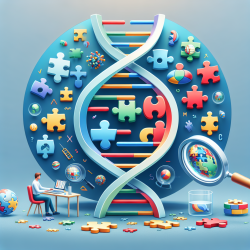Introduction
In the realm of autism spectrum disorder (ASD), understanding the genetic underpinnings can significantly enhance personalized treatment and management strategies. A recent study titled "The Temple Grandin Genome: Comprehensive Analysis in a Scientist with High-Functioning Autism" provides groundbreaking insights into the genetic factors that may contribute to ASD. This blog explores how practitioners can leverage these findings to improve outcomes for children with autism, focusing on data-driven decisions and evidence-based practices.
The Study at a Glance
The study conducted a comprehensive genetic analysis on Professor Temple Grandin, a renowned scientist with high-functioning autism. Utilizing advanced genetic testing methods such as chromosomal microarray analysis, whole exome sequencing, and whole genome sequencing, researchers identified several genetic variants that may contribute to ASD. Notably, variants in the SHANK2, ALX1, and RELN genes were highlighted as potential risk factors.
Implications for Practitioners
For practitioners in the field of speech-language pathology and other related disciplines, these findings underscore the importance of genetic testing in understanding and managing ASD. Here are some actionable insights:
- Personalized Treatment Plans: By identifying specific genetic variants, practitioners can tailor interventions to address the unique needs of each child. This personalized approach can enhance the effectiveness of therapy and improve outcomes.
- Early Intervention: Genetic testing can facilitate early diagnosis, allowing for timely intervention. Early intervention is crucial in maximizing the developmental potential of children with ASD.
- Family Education and Support: Understanding the genetic basis of ASD can help families better comprehend the condition, leading to improved coping strategies and support systems.
Encouraging Further Research
While the study provides valuable insights, it also highlights the complexity of ASD's genetic landscape. Practitioners are encouraged to stay informed about ongoing research and advancements in genetic testing. Collaborating with genetic counselors and researchers can further enhance the understanding and application of genetic data in clinical practice.
Conclusion
The Temple Grandin genome study exemplifies the potential of genetic research in revolutionizing the management of autism spectrum disorder. By integrating these insights into practice, practitioners can contribute to more effective, personalized care for children with ASD. To read the original research paper, please follow this link: The Temple Grandin Genome: Comprehensive Analysis in a Scientist with High-Functioning Autism.










